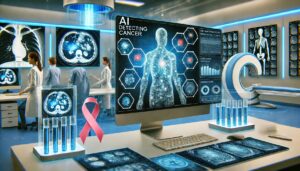Early disease detection is a cornerstone of modern healthcare, enabling timely intervention that can drastically improve patient outcomes. One of the most significant contributors to this process is the field of pathology, which plays a critical role in diagnosing diseases before they become severe. By analyzing samples of tissues, blood, and other bodily fluids, pathologists can detect abnormalities that may indicate the early stages of various health conditions, from infections to cancer. In this blog post, we will explore the role of pathology in early disease detection, how it contributes to preventive healthcare, and why it is vital in the fight against serious illnesses.
Understanding Pathology
Pathology is the branch of medical science that studies the causes and effects of diseases by examining bodily fluids, tissues, and organs. It is a key player in diagnosing diseases, understanding their progression, and guiding treatment. Pathologists, the medical professionals who specialize in this field, work closely with other healthcare providers to identify diseases accurately.
There are several subspecialties within pathology, including clinical pathology, anatomical pathology, and molecular pathology, all of which contribute to early disease detection. Each subspecialty provides insights into different aspects of a patient’s health, offering a comprehensive view of potential health risks.
Key Role of Pathology in Early Disease Detection
The role of pathology in early disease detection is multifaceted. Here’s a breakdown of how pathology is instrumental in identifying diseases at their earliest stages:
1. Early Identification of Cancer
Pathology is crucial in the early detection of various cancers. Through techniques like biopsy analysis, cytology, and molecular testing, pathologists can identify cancer cells long before symptoms appear. This early identification allows for timely treatment, which is often more effective and less invasive. For example, a Pap smear, a form of cytology, is used to detect abnormal cells in the cervix that could indicate cervical cancer. Detecting these cells early significantly increases the chances of curing the disease.
2. Detection of Infectious Diseases
Pathology is essential for diagnosing infections by analyzing blood, urine, or tissue samples. By identifying the presence of bacteria, viruses, or fungi, pathologists can help doctors initiate the right treatment before the infection worsens. Early detection is especially important for diseases like tuberculosis, hepatitis, and HIV, where early intervention can prevent serious health complications and reduce the risk of spreading the disease to others.
3. Monitoring Chronic Conditions
Pathology doesn’t only help with initial diagnosis but is also critical in monitoring chronic conditions. For instance, regular blood tests can detect abnormalities in liver function, kidney function, or glucose levels, indicating the progression or improvement of chronic diseases like diabetes, liver disease, or renal failure. This continuous monitoring enables healthcare providers to adjust treatments as needed, keeping the patient’s condition under control and preventing complications.
4. Genetic Testing and Screening
Advances in molecular pathology have made it possible to detect genetic mutations that may predispose individuals to certain diseases. Genetic testing allows for the identification of inherited conditions like cystic fibrosis or predispositions to cancers like breast or ovarian cancer. Knowing these risks ahead of time can lead to proactive measures, such as increased screening or preventive surgeries, significantly improving patient outcomes.
5. Blood Tests and Biomarkers
Blood tests are a routine part of medical checkups and are often the first step in detecting potential health problems. Pathology laboratories analyze these blood samples to check for biomarkers, such as abnormal levels of enzymes or hormones, which can indicate diseases like heart disease, thyroid disorders, or anemia. By detecting these abnormalities early, healthcare providers can implement treatments that prevent further complications.
The Importance of Pathology in Preventative Healthcare
The role of pathology extends beyond diagnosing diseases; it is an integral part of preventive healthcare. Preventative healthcare focuses on identifying risks and taking proactive steps to prevent diseases from developing or worsening. Pathology aids in this by providing critical information that can guide preventive strategies.
For instance, routine screenings such as mammograms, colonoscopies, and blood tests rely on pathology to detect abnormal cells or biomarkers that could indicate the early stages of diseases like cancer, diabetes, or heart disease. By catching these conditions early, patients have the opportunity to seek treatment before the disease progresses, reducing the need for more aggressive interventions later on.
Moreover, pathology is essential in the management of public health. By identifying and tracking the spread of infectious diseases, pathologists play a crucial role in preventing outbreaks and protecting communities.
Pathology and Personalized Medicine
Personalized medicine is an emerging field that tailors medical treatments to the individual characteristics of each patient. Pathology, particularly molecular pathology, plays a significant role in this field by analyzing a patient’s genetic makeup and the molecular structure of their disease. This information allows doctors to design more effective treatments that are specific to the patient’s unique condition, improving the chances of successful outcomes.
For example, in cancer treatment, molecular pathology can identify specific mutations in a tumor that make it responsive to certain drugs. This allows for a targeted approach, which is often more effective and less harmful than traditional treatments.
Challenges in Pathology and Early Disease Detection
While the role of pathology in early disease detection is indispensable, it is not without challenges. One of the main issues is the availability of resources, particularly in underdeveloped regions, where access to advanced pathology labs and trained pathologists is limited. This can delay diagnosis and treatment, leading to worse outcomes for patients.
Additionally, the complexity of some diseases, such as cancers that are difficult to detect in their early stages, poses challenges for pathologists. Continued research and advancements in diagnostic technologies are necessary to improve the accuracy and speed of early disease detection.
Conclusion
Pathology is a fundamental part of early disease detection and preventive healthcare. By analyzing tissues, fluids, and genetic material, pathologists provide critical insights that guide diagnosis and treatment. Whether it’s detecting cancer in its earliest stages, identifying infectious diseases before they spread, or monitoring chronic conditions, the role of pathology cannot be overstated. As medical technology continues to advance, the field of pathology will undoubtedly play an even more significant role in shaping the future of healthcare.
For more in-depth information about the latest advancements in pathology, visit this detailed resource on pathology practices.
You can find additional insights on the role of diagnostic tests and pathology in healthcare in our blog post on Common Diagnostic Tests: What Do They Reveal About Your Health?.
By understanding the role of pathology in early disease detection, we can appreciate its vital contribution to improving patient outcomes and advancing the field of medicine.




